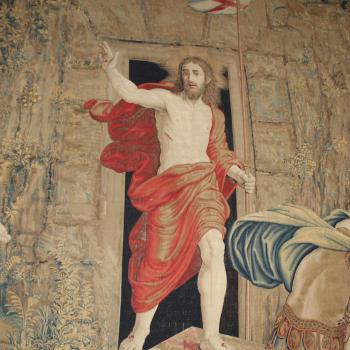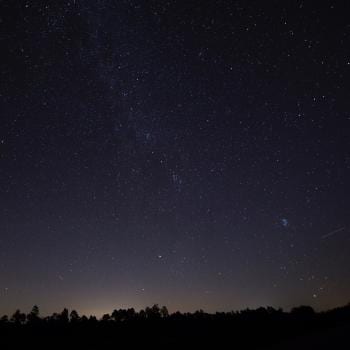What should we do with Holy Saturday? At first glance, Holy Saturday is a day in which nothing happens. In which the future is uncertain and the realm of God is here and not-yet. In which no one expects a resurrection. Holy Saturday is the time in which we live, when our future, the future of our nation, and the future of our planet is uncertain.
During Holy Week, most of us focus on the palms, the passion, and the resurrection, leaping over the wilderness of Holy Saturday. The movement from celebration to desolation and surprising celebration again characterizes not only Holy Week but the realities of a meaningful life. We can’t escape suffering but our suffering is often transformed into joy by surprising events or unexpected insights and experiences. In the shadow of loss, the light of new birth often emerges.
For many Protestants What – but also for Roman Catholic and Orthodox Christians – Holy Saturday is a forgotten day. We experience the juxtaposition of the Passover Meal and Last Supper, and betrayal of Maundy Thursday, and the darkness of Good Friday, but usually devote Saturday to preparing for our Easter feasts and egg hunts. Still, I believe there is good reason to see Holy Saturday as a key movement in Holy Week and a window into the realities of life.
Holy Saturday is the day of suspense and uncertainty, clouded over by tragedy and suffering. Nothing happens and nothing is expected. The future is in doubt and Jesus’ followers wonder if they will ever be able to hope again. That Saturday must have appeared to go on forever as grief, fatigue, fear, hopelessness, and shame filled their spirits. Is Jesus really dead? Has God’s vision of Shalom been defeated? Was his message true or just another pipe dream? And when they looked at their own lives, Jesus’ followers struggled with personal uncertainty. Would they ever celebrate again? Could they ever live with themselves after abandoning the One who loved them? Was their faith misplaced and misguided?
Holy Saturday’s suspense reminds us of many of our own lives. These days we live in suspense. We have lived with the suspense of COVID and its uncertainty, not knowing whether we might find ourselves among the intubated. Believing ourselves in the twenty-first century superior morally to our predecessors, we witness Russia’s invasion of Ukraine and the attending war crimes and also the atrocities of October 7 committed by Hamas and the subsequent atrocities committed by the Israeli government. Proud of our democracy and education, we witness the sanitation and minimization of the insurrection of January 6 by those who claim to love our country, false claims of election fraud, the rise white Christian nationalism, and the widespread anti-science and anti-democratic factions in our nation are escalating.
Our lives have changed radically, and the dark side of our nation has been revealed. Many of us deal with broken hearts, lost loves, chronic illnesses, failure and joblessness, hopelessness, alienation, and life-threatening illnesses. We remember, quite unrealistically, the “good old days” (some even think there were “good old days” four years ago!) in the past but experience the disorientation of the present and wonder if the darkness and depression will ever lift. Just when it can’t get any more unhinged, we view a prevaricating politician not known for any religiosity or loyalty beyond self-interest hawking a USA Bible complete with Constitution and the Pledge of Allegiance and glorification of the USA’s chosen status as God’s beloved country and, presumably, his status as God’s chosen messenger to a godless nation.
Holy Saturday reminds us that we can’t skip over the rough spots in Holy Week and in our own lives to get to the happy ending – the resurrection of Jesus and God’s triumph over death in all its forms. We need to remember that Jesus’ first followers were caught up in a Sabbath interlude and had no expectation of resurrection.
While we will soon live in a world of familiar stories of triumph and new life, I suggest that we take a few minutes on Holy Saturday to contemplate Holy Week as if there were no Easter. What would it be like to live through Holy Week if there were no guarantee of an empty tomb and open future? What if we had no hope for a better world, or for our own transformation? Although we can’t obliterate our Easter memories, we can bracket them for a few hours of meditation, imaginative prayer, or a long walk with no pre-planned destination. We can reflect on the uncertainties and suspense-filled situations in our own lives. We can ponder possible futures in which there may not be a happy ending. If we take Holy Saturday seriously, we can no longer domesticate Easter – as we have Christmas – as an expected and normal event, and not the radical and unexpected transformational surprise that Sunday morning.
Such reflection on Holy Saturday is not sentimental melancholia but an invitation to see the whole picture of life – the realism of loss and uncertainty and the deeper realism of new life emerging out of the darkness of the earth and the hopelessness of the grave. If we live with the realism of a world without resurrection, even for twenty-four hours, then, when it happens: Easter will burst forth in ways that surprise and change us if we take pause to experience the Holy Saturdays of our lives. We will know the joy of healing, of resurrection, and new life and will join the first women and men in joyful celebration. We will be inspired to “practice resurrection” – to be prophets of a deeper reality, the reality of divine healing love and global transformation, of new life and adventure that asks us to be new and adventurous – in a world of real uncertainty and real pain.
+++
Rev. Bruce Epperly Ph.D. has served as a professor, seminary administrator, university chaplain, and congregational pastor at Georgetown University, Wesley Theological Seminary, Lancaster Theological Seminary, and South Congregational Church United Church of Christ on Cape Cod. “Retired,” he continues to teach in the Doctoral of Ministry program at Wesley Theological Seminary, give seminars, write, and rejoice in grandparenting and marriage with Rev. Dr. Kate Epperly. An ordained minister in the United Church of Christ and Christian Church (Disciples of Christ), he is the author of over eighty books, “The Elephant is Running: Process and Open and Relational Theology and Religious Pluralism,” “Jesus: Mystic, Healer, and Prophet,” “Walking with Francis of Assisi: From Privilege to Activism,” “Simplicity, Spirituality, and Service: The Eternal Wisdom of Francis, Clare, and Bonaventure,” and “Taking a Walk with Whitehead: Meditations with Process-Relational Theology.” His books on faith and politics include, “Talking Politics with Jesus: A Process Perspective on the Sermon on the Mount,” “One World: The Lord’s Prayer from a Process Perspective,” and “Process Theology and Politics. His most recent texts are a trilogy: “Process Theology and Healing,” “Process Theology and Mysticism,” and “Process Theology and Prophetic Faith.” He may be reached at [email protected].













